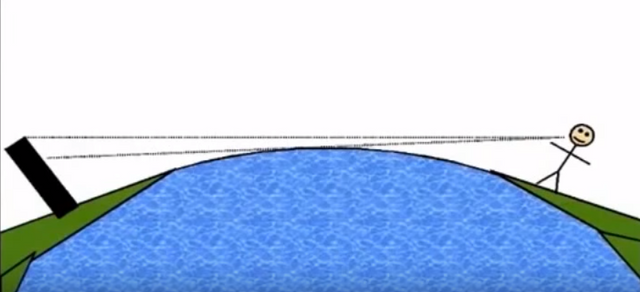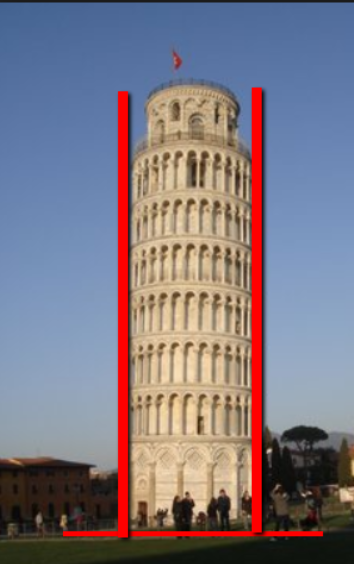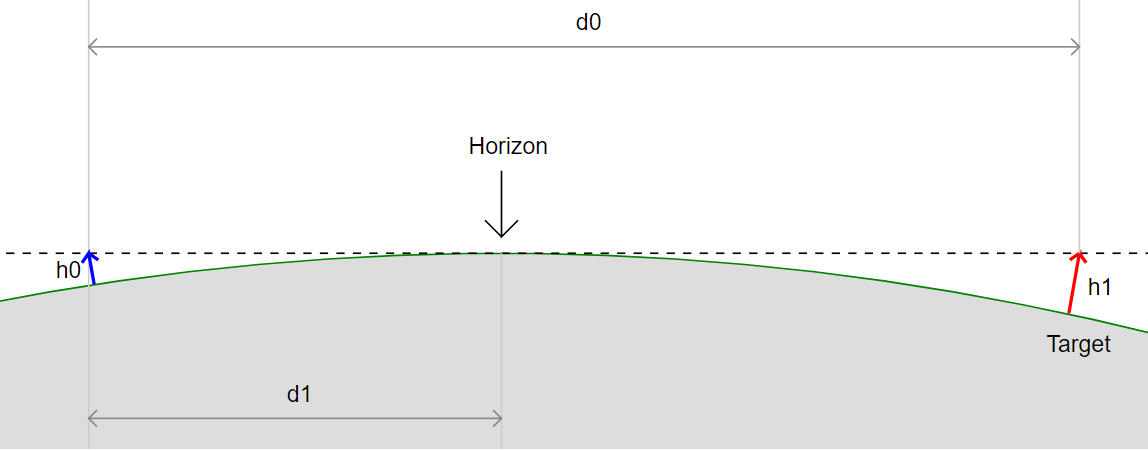If We Lived on a Sphere, Wouldn't Buildings Appear to Lean?
We've been discussing the meteoric resurgence of people who believe in a flat earth, and one of their many proofs of claim (when they have any at all besides just declaring the earth is flat and denying any evidence to the contrary) is that, if we lived on a sphere, mountains and buildings should appear to be leaning away from us. We are not talking about the rare exceptional building, such as the leaning tower of Pisa, or one, like the Capital Gate in Abu Dhabi that was built to lean, but the average building, such as a skyscraper, that was built well and is 'plumb', or at a 90 degree angle, to the ground.

Capital Gate Building in Abu Dhabi
Courtest of Wikipedia.com
It's true, if a building is far enough away from a person, or another building, the objects would, indeed, lean away from us on a sphere the size of the earth. Flat earthers love to illustrate this concept in a mocking fashion,with drawings that appear to have been done by a 7 year old.

Image Credit: Just a meme
While the CONCEPT in the drawing is correct, what flat earthers do not seem to understand is the math and the scale. They seem to think that because they made the drawing look like the building is leaning at a 45 degree angle, then even a building 20 or 30 miles (32-48 km)away should be leaning at a 45 degree angle away from them!
Anyone with any degree of understanding of the size of the earth, however, would understand that this drawing, if it were to scale, would represent a building and person who were as high as outer space and more than a thousand or more miles (1600 km) away from each other!
Buildings Should and Do Lean Away From Us
As I said, the concept in the drawing is correct; since we live on a sphere, buildings far away from us actually do lean away from us. This is because, if you drop a plumb line from a building, it will drop at a 90 degree angle from the building (assuming the building actually is at a 90 degree angle to the ground, as most, but not all buildings are).

Image Courtesy of Wikimedia Commons
Now imagine, you are viewing two similar buildings from a distance, each of which is equidistant from you, and each of them plumb to the earth. If you could 'slide' these buildings further and further away from each other, eventually, the curvature of the earth will come into play and the buildings will lean away from each other. So, yes, flat earthers are correct in that the buildings should lean away from us and each other like the observer and the building do in the flat earther drawing above.
However, one problem with flat earthers is that they tend to have lots of expectations about what they should see or what should occur on the a globe the size of the earth without having actually figured out the reality of such things. In other words, they fail to fact check what actually should occur and simply consider their belief system a fact. This occurs over and over again when talking with flat earthers, and for some reason they will resist any and all facts contrary to these erroneous expectations they literally pull out of their imaginations.
Correcting Expectations
How much the buildings should lean away is the question that flat earthers should have asked before making a claim about buildings leaning in the first place, but since they don't, we'll have to answer the question for them since they are not inclined (pun intended) to do it themselves.
To proceed, we have to do some simple math, something flat earthers often think was put on earth to fool or control people (not joking), although they will happily use math formulas they don't understand incorrectly and in the wrong situations if they think it supports a case for a flat earth.
The earth is a 360 degree sphere, with a circumference of between 24812-24900 miles (39931-40072 km). I'll use the 24812 miles number to be biased towards having more lean than less, even though the difference will be miniscule.
So the VERY VERY easy math that flat earthers don't bother to do is to simply divide 24812 miles by 360 degrees to get how many miles we would need to be away from an object for each degree of lean.

Image Courtesy of Pixabay
That gives us 68.9 miles (110.8 km) for every one degree of lean on a sphere the size of the earth. So, for every 68.9 miles distant you are from a building, you would expect to see it lean ONE SINGLE DEGREE. Even the world record longest land to land photography image, at just over 300 miles (482 km), would only show an approximately 4 degree lean.
The Next Question Flat Earthers Haven't Asked
So, first of all, you'll need a telescope to see buildings in any amount of resolution at 70 miles because they will be so small. Next, instead of making assumptions, we need to determine if we can even visualize a one degree lean.
You can test this for yourself, via either a real experiment or a thought experiment. Take two pencils and a bit of foam, clay, or play doh. Use a protractor to get the first pencil to stand at an exactly 90 degree angle. Take the second pencil and stand it next to the first pencil at an 89 degree angle. Now, walk away a couple of paces and look back at the pencils. You could do the same by putting two water glasses side by side and angling one side with napkins or toothpicks until you get the one degree lean the experiment requires.
Results of the Experiment
Did you see the lean on the pencil or the water glass that is leaning? Heck, you probably didn't even bother to do the experiment because it's so ridiculous. Even if you DID do the experiment, I suspect you would have found it extremely difficult to even measure the one degree difference, let alone see it. The eye is simply not that sensitive of a measuring instrument.
An even better experiment is to go look at the leaning tower of Pisa and look at it where the lean is away from you and not to the side. If you can visualize a lean at all, it will be extremely slight, even though the tower is leaning at almost four degrees, about the same lean as the world record photography distance. These slight leans, particularly when they are leaning away from us, are simply too slight to see.

Image credit: Wikimedia
Perhaps one might think it would be easier to see objects lean away from each other with the observer looking at two objects far away from each viewing them from the side, as in the drawing above. That produces other challenges, however, since the visual angle of a camera and the eye is too narrow to capture objects that are far away from each other in high enough resolution to see them clearly. That's why the panoramic function on cameras was invented.
For instance, you might think an image of the Chicago skyline might be a good way to visualize the lean of buildings away from each other, but this panorama of Chicago only encompasses about a mile (1.6 km) of the city! That is far too small to notice any lean.

Image credit: Chicago Inno under a fair use claim
Even though we discuss why our senses fool us in the article Should We Really Trust our Senses, flat earthers seem to think they should detect the most minute change in just about anything, such that if they cannot physically see the change they will declare it non-existent without measuring it, and declare it 'science' to have done so.
Yes, buildings SHOULD lean away from us on a sphere the size of the earth, but not to any degree noticeable by the human eye and cameras are simply not going to have a wide enough field of view to be able to detect or measure any lean of buildings or objects away from each other. And the panoramic function on a camera would correct for any lean in order to make the image appear straight anyway.
This is simply not a way that we can determine whether the earth is flat or round because we would not be able to visualize buildings leaning away from us on a sphere the size of the earth. I believe any rational person would be able to understand this through the evidence that has been presented here.
The problem is that flat earthers are not rational, so will reject this rational and easy to understand proof for ridiculous reasons, such as that math is from the Illuminati or the Freemasons, and so you can't trust the simple math I showed here! I really couldn't make that up if I wanted to.
Cracks me up when people use a proof for flat earth when trying to convince people it's a sphere.
"Even the world record longest land to land photography image, at just over 300 miles (482 km), would only show an approximately 4 degree lean."
My question regarding this quote is: How do you think it's possible to see 300 miles away when your magic sphere should be hiding the image with 60,000 feet of curved water?
Just something for you to think about, try to come up with a good answer, I'm interested in your response.
Thanks for the laugh though. It was fun to read more ignorant assumptions about a group of people, when there's no backing other than guesses.
I am happy to answer that question.
Your statement that after 300 miles, the Earth should have curved 60,000 feet is based on the result you get from using the GitHub Earth Curve Calculator, or at least the same formula. (Other readers are advised to play with the calculator and see for themself).
Now, what you have to know is that this formula is just the math based on a perfect 2dimentional circle. As the site demonstrates with the image below:

Height h0 and h1 are measures of the distance from a straight line and down to the circle. But for this to be applied to an experiment, you must make the assumption that the curvature is equal at all times. So basically assuming that the Earth is a perfect sphere. So yes, the fact that there is a point on Earth where one can take a 300mile photography does indeed disprove that the Earth is a perfect sphere!
However, nobody believes that it is. We've known for a long time that the Earth is very far from a perfect sphere (if this was to be literally true, the Earth's surface would be slick as a bowling ball). Instead, the model of the Earth that we have is one that is bulky and uneven. I mean, it would be amazing if even millions of years of titonic plates moving and colliding we would have been left with a complete perfect mathematical circle?
Below you can see the best model that we have according to our measures from the GOCE Satellite that we launched in 2009.
As you can see, the curvature is very different at different points of the Earth. This is why you can have some places on Earth that allow for longer distant photographs than others.
I doubt this will change your or Fulltimegeek's mind, but your question made the direct assumption that for the Earth to be round, one should necessarily see 60 000 feet curvature anywhere after 300 miles. This is simply not the model you're tasked to falsify. So I hope that at least it may have helped clarify what it is that the current model suggests is.
So there's the backing for his claim that one can be, and should be, able to find a place on Earth to take a longer distant photograph than others.
Steem on.
It's even simpler than that, too: https://en.wikipedia.org/wiki/Refractive_index
There are whole communities of photographers trying to get the longest shots possible, and they use this to their advantage, picking optimal locations, climates, time of day etc to maximize the refraction of light. This is where you find these 'record length' shots. They didn't just climb a mountain, they prepared hard for it.
And their observations always matches the models! I mean people should stop and ask themselves why, by chance, everything works when we use nautic miles and when photographers, like you say, use this model to find places to take photos.
Anyhow, my reply was just as much just trying to explain calmly why it is that we don't see the same rate of curvature that you get when you plug it into the calculators you find online.
Yes , refraction enables us to see the back of our heads while looking forward if on the highest point on earth, right? If not explain why not?
That model of the proposed appearance of Earth is very extreme. Where did Australia go? I would like some more info on what it represents. Highs and lows obviously but what are the figures. It is very drastic. Why do no other planets also have such characteristics?
I'm not a flat Earth believer but I also think that some that is presented as evidence for sphere Earth is questionable also. I'm not denying the satellite, or that the render in that image is factual. I just now think... WHY.. is Earth the only one that would be all lumpy and all the other planets not?
No it is not extreme, it just looks extreme because here you see the shape of the planet without water.
When you add it then it looks more spherical, but you still have the unevenness that accounts for why the earth does not curve 60000 feet after 300 miles, at every point on Earth.
That explanation raises more questions than answers. The deepest known point, The Mariana Trench is alleged to be 11 km deep. That model appears to indicate that it is a canyon on elevation. It then places a very massive indentation (by the deep blue indicator) on the opposite side of the continent of Asia.
In this video and by scientific calculations, the amount of water on Earth does not equal a very large mass. Leaving the Earth to still appear quite uniform and spherical in shape. (1:49)
I don't treat YT videos are science but Riddle at least tries to keep it factual. It's just hard to accept that the Earth would look like that without water. One then must believe that some areas of the ocean are close to or more than 100 kilometers deep.
only if one assumes that when the water is added, the result is a perfect circle (because yes, that would be the approximate level of water needed to return the height of the deeper valleys up to the level that kind of level).
However, we know the world is far from a perfect sphere, as is demonstrated both from our InSAR radar satellites and also ground-based observations showing differences in how far you can see on the ground.
So long story made short: When you add water to the image in the video I linked, it becomes less extreme, but still far from a perfect sphere.
In Riddler's video, there isn't near enough water to fill even a small area of those valleys. Thus in that Earth, the above sea level measurements would give some extreme readings in many regions of Earth.
Coincidentally, from the perspective of human, we would also see some bizarre anomalies in many regions. A rising horizon such as when one is at the foot of a mountain range would be a common sight. One would observe gigantic mountain ranges. From the perspective of Brazil facing towards Chile for instance.
I don't mean to discredit you nor the scientific community here. I'm merely questioning what logic determines as a clear discrepancy. Which evidently, is why the conspiracy of Flat Earth has grown in magnitude in recent years.
There ARE conflicting 'truths' within the science community and from reputable organizations, which in turn fuel speculation. Proclaimed images of Earth by NASA vs the now standardized version of a lumpy Earth alone would mean that one is a fallacy.
By looking from one high point to another high point.
From up on Mt. Hood when I was not quite at the peak but at approximately 10,000 feet I could see to the Three Sisters (about a hundred miles away) which are also about 10,000 feet. In between, the land was much lower.
Flat earth people incorrectly apply the 8 in per mile formula. That formula is applied to the level line that is tangent to the observation point. Here is a utility that will show how much is hidden by the curve.
http://dizzib.github.io/earth/curve-calc/?d0=1429&h0=1314720&unit=imperial
No, that is the calculations he used. And he is right that the results you get does not match observations at every place on Earth. It is only right on average.
See explanation in my comment.
Earth is flat 🗺 nasa lie
Minute construction errors that actually make buildings lean can't be seen without sophisticated instruments. Moreso the 'lean' due to mere distance of the observer from the building. Why don't they notice that most planes seem going down as they approach the horizon even just after taking off? Ships also appear to sink on the horizon! Why don't they watch the sunset while sitting low, then notice it rise back up slightly when they stand up? Just using this observation along with a little complex math is actually enough to calculate the earth's size!
I'm from the Illuminati and I approve of this post. But it's wrong. Earth is a hollow cuboid.
Lol.
funny
Very nicely presented and argued. I have been intrigued by the flat Earth arguments, and some are very convincingly presented, but I keep coming back to the basic facts and find that many flat Earthers will not accept the argument against one of their "proofs" without simply bringing up another argument that is unrelated. I am by no means an expert, but am curious as to how a flat earth fits with the idea of circumnavigation of the planet. Do they also argue that the stars or other satellites around the sun are flat or that Earth is the only flat planet. Interesting discussions on something that most of us assumed was a dead topic long ago. Will definitely follow.
" but am curious as to how a flat earth fits with the idea of circumnavigation of the planet. "
It doesn't.
At all.
Probably not worded properly. What I was trying to get across is that we have had people circumnavigate the world by boat and plane, so I wonder how they reconcile these feats with the idea of a flat earth? Is there simply denial that these events have occurred or ??? If one follows a magnetic compass generally Westward (or Eastward if that is one's preference) and you arrive back at your place of origin... what is the explanation if the world is flat? Sorry if I was vague... I promise it made sense to me when I typed it. Thanks for replying.
I knew what you meant. :)
They just deny it. They deny that anybody has circled the antarctic, that anybody has circumnavigated the globe, etc.
All lies and conspirators trying to keep the truth of the flat world from the masses.
Wow, nice article. Math, physics, common sense seem to evade flat-earthers. Your article lays it out very well and in nice, easy and simple terms. However, expect the obligatory meme's to flow in as contrary proof. I enjoyed your reading your post.
Here's some fun for the Flat Earther people :) lol
Do you see the trick :)
This is from my MEQUAVIS project
post @ https://steemit.com/programming/@nanocheeze/huge-update-to-the-nanocheeze-app-vr-simulator-is-live-bitcoin-monero-and-ethereum-wallet-hasher-added-to-gridware-many
My point here being that if the world were flat and a simulation and all that nonsense then I think they would do a better job than letting you think it was flat and there are many very simple tricks that can be done on the optical illusion side. Seeing the curve is what would make me question things, not, not seeing the curve lol...
OO really interesting :)
I work near the leaning building in San Francisco that has tilted 14 inches but trust me you can't see it. Our eyes are not nearly accurate and distortion free enough to notice it.
Another way to look at this problem - get to equal desks and stand vertically but a mile apart - preferably in a very long indoor halfway. Use a laser to go perfectly horizontally from one desk to the other and you'll see it hits the other about six inches above the other. Yup six inches - it is that far off at only one mile!
If flat earth theorists had an iota of a brain, they'd realise that with a 40,000 kilometer radius, you'd need over 109 kilometers to even respresent 1 degree of the 360 degrees of a sphere.. So this isn't even worth an argument ... Flat earth - duh what argument anyway :)
Hey, it's nice to see you posting again :)
Your post is awesome, as we are used to, and sharing knowledge to both those who are eager to learn and to those who are ignorant.